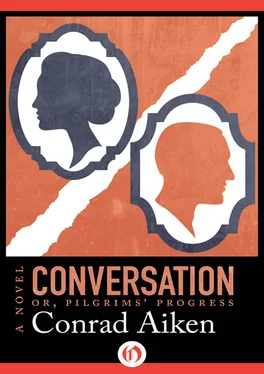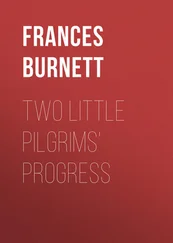“She sure can play, can’t she?” he said.
“Yes, she sure can. What was this about your technique, Jim?”
“Oh, that. I guess that wouldn’t interest you much, would it, kid? I always thought it wouldn’t interest you much.”
“Sure it would. I never asked you, because I thought maybe it was something you didn’t want to talk about.”
“Not at all. As you know, Tip, I’ve always tried to be the reverse of secretive about it, about every aspect of it. That was very important!”
“Yes, I know.”
“The same with this. It’s better to be frank about it, isn’t it? But it might interest you, at that. I think it’s pretty good.”
He smiled, and there was evident relish in the way he spoke of it — evident enjoyment. Was this the weak spot in his “case,” perhaps — in the case he made out for himself? Was it perhaps, after all, a kind of compulsion, and the anarchistic theory merely a delayed rationalization? Perhaps the stealing came first?
“I’d like very much to hear about it.”
“It’s really quite simple, but of course it took some working out. I made some mistakes. But now it’s pretty nearly foolproof. You know I always specialize in furs?”
“Yes, I knew that. Karl told me.”
“That was the first step, you see. I got to know everything I could about furs — quite a lot. Well, now, suppose I’m going to start out on an expedition. I’d pick out two or three big cities — only big cities, Chicago and St. Louis one time, Cleveland and Detroit the next — and go to just those two or three. All right, and suppose I go to Boston, say.”
“Did you ever actually try Boston?”
“As a matter of fact, kid, I did, and I could tell you the name of the store, but I won’t, because that might make you a kind of accessory, see? All right now, suppose I go to Boston. I spend the first two or three days just going round to the big department stores, and looking over the layout — finding out where the fur department is, and the other departments, all the arrangements, the stairs, the lavatories, everything like that — and what time they open in the morning and what time they close at night.”
“Yes, I see.”
“Okay. Well, I pick out what seems to be the best one, and get to know it pretty well. And then I go in some afternoon just a little before closing time. I’m wearing a cap — like this — and inside my coat, buttoned up, I’ve got a couple of big paper bags, folded small — just ordinary coarse paper bags. Well, I go to the men’s lavatory, in the basement, into a w.c., and stay there quietly till maybe half an hour after the store is closed. Then I come out — but first I take my cap off, see, and put it inside my coat, or in a pocket — you get the idea?”
“No?”
“That’s so I’ll look like some sort of employee. If I meet anybody I’ll look like an employee; and I can just say I’m a furniture polisher going up to the furniture department to do some polishing.”
“Sounds simple enough!”
“It is. There’s hardly ever any trouble about that. Well, then, I go upstairs, without trying to hide myself at all, and maybe in this store we’re talking about the fur department is on the way to the furniture department — which makes it easier. I go to the fur department, and by this time, with any luck, it’s deserted. If it’s not, I keep on going, of course, and come back later. But if it’s deserted, and no one around, then I pick out a couple of small but good furs — small, see, because they’re easier to handle. And that’s where the paper bags come in. I put them into the paper bags, and tie them up with heavy string, so as to make them sort of clumsy-looking parcels, the sort nobody would think was of any value — just ordinary bundles. But I don’t take them out with me. No. Oh, no.”
“What do you do?”
“This is where the real technique comes in, kid — I think it’s pretty good! What I do is this. I take the two bundles into the furniture department, and that’s deserted, too, if I’m lucky — and then I go to a chiffonier or chest of drawers, probably one I’ve picked out beforehand, because it’s a little out of the way, in a corner, or behind other stuff — you’ll see why in a minute. All right, I open one of the drawers, and put in the bundles — but I don’t quite shut the drawer again. I leave it about a half an inch open — just so that the edge of the drawer is sticking out a little — and then I take a broken match, a very small piece of broken match, and put it on the edge.”
“Good lord, Jim.”
“Yeah. And that’s all. Then I go downstairs again and go out. The watchman is at the door, of course, but that’s easy. I’ve got nothing on me, and if he asks any questions, well, I’m just a new furniture polisher; and so there’s usually no trouble, he lets me out.… Well, that’s the first stage. The second comes next day. This is a little more ticklish — and now is where the broken match comes in. What I do is wait till the rush hour is on — say, about twelve o’clock, see?”
“Yeah.”
“And then I go in and go straight up to the furniture department. This time, of course, I’m just an ordinary shopper; just somebody looking at furniture; sort of sauntering round. Well, I don’t want to go too close, in case there’s been a slip-up, or the bundles have been discovered — that happened to me once — and maybe I pretend I’m looking at something else, walking slowly by, but I manage to take a look at that drawer, from a little way off, to see if that small piece of broken match is still there. It has to be pretty small, of course — about a quarter of an inch, so as not to be too conspicuous, and put kind of at one side, too — otherwise one of the salesmen might spot it, and look in. All right, I take a quick look, and see it’s there, or not there. If it’s not there, I don’t take any chances — I go while the going is good. It means that drawer has probably been opened. But if it’s there, and in exactly the same place, which I can easily tell, then the chances are fifty to one it’s okay — and of course, too, if the drawer, and the other drawers, are all just the way I left them. You can notice those things — there was once, in New York, when at first it looked all right to me, but there was just a little something that made me hesitate — it just didn’t seem quite right to me, god knows what it was — so I hung round a little way off and waited, pretending to be looking at things; and pretty soon along came a guy with my two bundles in his hands and put them back in that drawer—”
“Good lord, setting a trap!”
“Setting a trap. So, of course, I beat it. But suppose it’s all right — well, then, it’s pretty easy. All I do is wait till there’s nobody much round there, or everybody busy, and just quickly take out the two bundles — and that’s all there is to it. Once I’ve got them in my hands, I’m safe as a church. Everybody else in a store has bundles — so what’s the difference, see? I walk out with maybe a thousand dollars’ worth of furs, and that’s that — it’s as easy as rolling off a log.”
“Well, I’m damned.”
“Yes, kid. Now you know. I think it’s pretty good.”
“It’s the most extraordinary thing I ever heard. My god, I should think it must be terrifying! Was it your own idea, Jim? How’d you ever think of it?”
“Yes, I just sort of worked it out. I started with the idea of the second day, you see, coming out with the bundles — and then just worked back. It was really very simple. You could have done it yourself, kid.”
“Not me, by god. I wouldn’t have the nerve.”
“Oh, it doesn’t take any nerve.”
“Oh, no! Of course not! I can see that!”
Читать дальше












